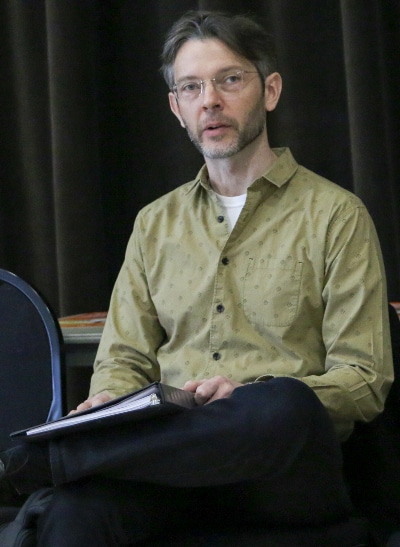DCPA NEWS CENTER
Enjoy the best stories and perspectives from the theatre world today.
Enjoy the best stories and perspectives from the theatre world today.
This article was published on January 10, 2019

‘The Whistleblower’ has its first performance on February 8. Photo by John Moore for the DCPA NewsCenter.
Rehearsals began this week for the DCPA Theatre Company’s world premiere of Itamar Moses’ new world-premiere play The Whistleblower. But as Director Oliver Butler pointed out, it began in earnest five years ago as a featured reading at the Perry-Mansfield New Works Festival in Steamboat Springs. So it will come to full life on February 8 just as it began: “At altitude,” he said.
Even if it the story takes place at sea level.
The Whistleblower is about a Hollywood screenwriter, but it’s not about Hollywood. It’s about a man who has had a sudden realization in his life: He just doesn’t want to lie anymore. About who and what make him happy. About what he sees are the things holding his loved ones back. About anything. So the filter comes off. Armed with a new sense of spiritual clarity, he starts to serve up some hard truths to his family and friends. It is a play, Butler says, that operates in very dangerous terrain: Radical honesty.
Butler and Moses each offered their opening thoughts on The Whistleblower that might also serve as a useful introduction of the play to upcoming audiences:

Karl Miller, last seen in Denver in Curious Theatre’s ‘columbinus,’ plays the screenwriter Eli. Photo by John Moore.
Playwright Itamar Moses: “The first influence for this play was Herman Melville’s Bartleby, the Scrivener. That’s a story about a guy who just starts saying, ‘I would prefer not to’ in response to everything. And by the end, we see him executed. My first kernel was thinking, ‘What about someone who just opts out?’ I was probably feeling like doing that at the time. This was in 2009 or ’10, which was when I first moved to L.A. to work in television and pitch ideas. It was very confusing to me because the prestige, the audience reach, the money, the cultural position of creating your own TV show all conveyed to you that this is a brass ring you definitely should grab for. The noise of that is so loud, it becomes very difficult to check in with your own actual feelings and ask yourself whether you have any actual interest in the stuff you are going to end up making. That was scary at first, but then it became very funny to me, this idea of someone saying the things you are not supposed to say that then folds up the house of cards of every relationship in your life.”
Director Oliver Butler: “This is a play that I have loved for a long time, but in the five years since I first met it, the world has shifted tremendously. And I have noticed that as the world changes the message of the play changes, and it now has these further resonances. I think we are in this period of self-reflection where I find myself hoping and wanting and needing to believe that if I can change myself, then I can change the world if only I can possibly go back and undo some of the learning that I grew up with, and some of the values I was taught by this country. And with that comes a desire to help others to change. But sometimes our need to be the helpful person can actually have a negative effect because our need to be that person is more important to us than actually doing the things that are required to make real change happen. The underlying point here is that you can’t actually hope to change anything in anyone else without first doing the hard work and looking deeper in yourself. And that’s where I find the hope in this piece. Change is something that can happen in tiny ways. If you can make small, fundamental changes in your own everyday life, then you can possibly make some small change in others and in the world.”

The cast and creative team for ‘The Whistleblower.’ Photo by John Moore.
Bonus I: So how do you pronounce the playwright’s first name? “I tell people it’s like the phrase ‘eat a marshmallow,’ only you remove the “shmallow.”
Bonus II: Moses is a new staff writer on Showtime’s hit TV show The Affair. When his first episode aired in August, The Onion‘s A.V. club called it the best in the show’s four-year history.
 The Whistleblower: Ticket information
The Whistleblower: Ticket information